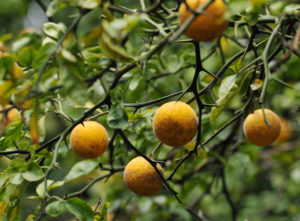The chromosome-scale genome sequence of trifoliate orange yields clues to disease-resistance that could prove fruitful for saving Citrus from greening disease.

Trifoliate orange fruiting at the Brooklyn Botanic Gardens. (Steven Severinghaus, Flickr CC BY-NC-SA 2.0)
You’ve probably never heard of trifoliate orange. Otherwise known as Poncirus trifoliata, it’s an evolutionary cousin of the Citrus genus, which gives us lemons, kumquats, limes, pomelos, mandarins, sweet oranges, and more. Unlike citrus, trifoliate orange ripens only bitter, intensely sour fruit. Yet this plant, native to China and now disseminated around the globe, often as a rootstock for Citrus, appeals in other ways. It better tolerates cold, withstands pests, and, especially tantalizing, resists a disease ravaging citrus groves: citrus greening. From 2012 to 2016, in Florida alone this disease caused an estimated $4 billion in losses. Currently, ninety percent of Florida groves are infected.
To better understand how trifoliate orange is able to resist citrus greening disease, which causes fruit to go unripened and a blotchy yellowing of leaves, a team of researchers sequenced P. trifoliata’s genome. Scientists at the US Department of Energy (DOE) Joint Genome Institute (JGI), a DOE Office of Science User Facility located at Lawrence Berkeley National Laboratory (Berkeley Lab), played a critical role in assembling, annotating and analyzing the genome in order to find the genetic traits responsible for P. trifoliata’s hardiness, according to Zhanao Deng, an environmental horticulture scientist of the University of Florida (UF) Institute of Food and Agricultural Sciences (IFAS).
Deng and colleague Fred Gmitter, a UF/IFAS professor of citrus breeding genetics and longtime JGI collaborator, are senior authors of the recent study published in The Plant Journal. this study included the discovery of candidate genes that confer resistance to citrus greening disease. Trifoliate orange may be a plant of bitter fruit, yet sweet are its genetic secrets.
This work builds upon JGI-supported research led by Gmitter and JGI’s Daniel Rokhsar, published over the last half-dozen years, on the ancestral origins of Citrus sinensis, the sweet orange.
Publication: Peng Z et al. A chromosome‐scale reference genome of trifoliate orange (Poncirus trifoliata) provides insights into disease resistance, cold tolerance and genome evolution in Citrus. The Plant Journal. 27 Sep 2020. doi:10.1111/tpj.14993
Relevant Links:
- UF/IFAS video: Citrus Genome Sequenced and news release: UF scientists make big stride toward greening-resistant citrus trees
- Trifoliate orange genome on the JGI Plant Portal Phytozome
- JGI Story: Determining the Citrus Ancestral Home
- JGI Story: Retracing early cultivation steps: Lessons from comparing citrus genomes
By: Alison F. Takemura